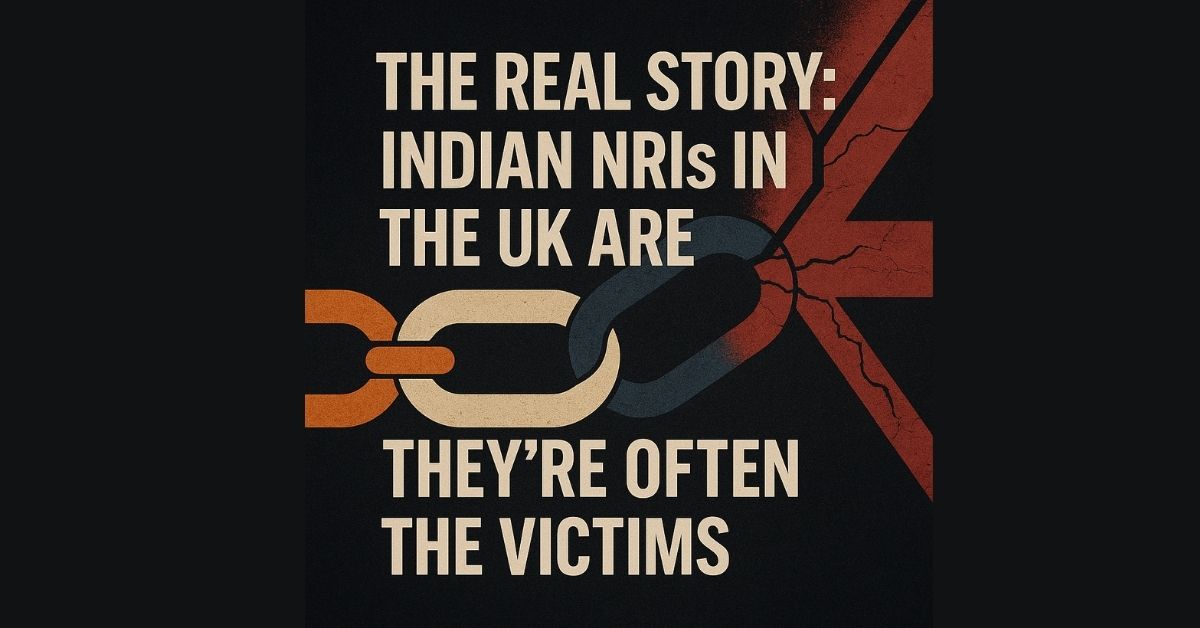On behalf of all Indian Immigrant in the UK
The Convenient Blame Game
In times of social anxiety and economic strain, immigrants are often the first to be blamed.
“You’re taking our jobs.”
“You’re changing our culture.”
“You don’t integrate.”
For Indian NRIs (Non-Resident Indians) in the UK, this rhetoric is familiar. But what’s rarely acknowledged is the irony behind it: those accusing us of cultural disruption come from a nation with centuries of history exporting its own culture—mostly forcefully—around the world.
From Colonisers to Critics: The Cultural Struggle of Indian Immigrants in the UK
Between the 17th and 20th centuries, Britain colonised nearly a quarter of the world’s land and people. It didn’t just extract resources but topped it with exported British laws, religion, education systems, and values to countries that never asked for them. 👉 Learn more: BBC Bitesize – British Rule in India
- Indian languages were replaced in schools by English.
- British Christianity was promoted at the expense of native faiths.
- Local governance and community systems were dismantled.
- Entire generations were taught to think in ways that favoured the coloniser’s worldview.
In short: British colonialism wasn’t cultural exchange. It was cultural domination.
And yet today, when Indian immigrants politely cook their food, wear their clothes, and speak their languages within their own communities, they’re told they’re “not integrating” or “changing the British way of life.”
Really?
Indian NRIs in the UK are not coming to impose. We are not missionaries. We are not rewriting your schoolbooks. We are not asking for Britain to change its identity.
We are doctors in your hospitals, educators in your schools, and researchers in your universities.
Our presence is felt not in disruption, but in contribution—often more than we receive. 👉 Explore: MEA – Indian NRI Global Contributions
We are contributing—often more than we receive. And yet, we face:
- Systemic discrimination in jobs and housing
- Underrepresentation in leadership positions
- Racism, both overt and subtle
- Visa insecurity, despite years of tax-paying contribution
- And worst of all, constant suspicion—as if we’re here to take something rather than give.
👉 Read more: India Today – Indian Diaspora and UK Politics
Indian NRIs in the UK vs. Colonial Memory: Who’s Reshaping Culture?
Is it the Indian family quietly celebrating Diwali with their neighbours?
Or the British Empire that rewrote entire cultures for centuries, from Bengal to Jamaica?
Is it the Indian software engineer coding British fintech products?
Or the colonial administrators who removed local governance systems and replaced them with laws that privileged the coloniser?
Let’s not pretend this is about “cultural preservation.”
It’s about control. And it’s about memory ,specifically, selective memory.
Specifically, the kind of memory that remembers only what flatters the mirror. A rich culture of remembrance, if only there had been one to begin with.
The truth is, India today is confident in its culture. Despite centuries of oppression, we have preserved our languages, our traditions, our values. And now, as India rises on the global stage, its diaspora reflects that same confidence. Thus, India’s cultural confidence is a victim to Britain’s cultural anxiety.
We don’t want to erase anyone else’s identity. We just want to exist with dignity.
Yet here in the UK, where identity is increasingly politicised, immigrants become easy targets for the things that have gone wrong. Whether that’s in the economy, public services, or social cohesion — which is a result of unplanned governance on theirs.
But here’s the uncomfortable truth: Indian NRIs are not breaking the system. We’re often the ones helping to keep it standing.
Why Indian Immigrants in the UK Deserve Respect, Not Rejection
British society often asks immigrants to “assimilate”—which is really just a polite way of saying, “Could you maybe not look so… immigrant?”
But look closely, and you’ll see: it’s not Indian culture that’s the threat. It’s the unwillingness of systems to include anything unfamiliar.
Wearing sarees and turbans is how we honour our roots—not a statement of separation.
Speaking Hindi or Tamil connects us to generations before us.
And when we celebrate our festivals, it’s to enrich the shared cultural fabric—not disrupt it.
This isn’t an invasion.
This is coexistence.
We don’t want domination, look back in history, we’ve seen what that looks like. We still live with its consequences back home. What we want is:
- Respect for our contribution
- Fair opportunity
- Space to be ourselves without suspicion
- And a recognition that integration is a two-way street
We are not asking Britain to apologise for the past—but we do ask that it not repeat it in modern form.
If Indian immigrants seem protective of their culture, perhaps it’s because we’ve seen what happens when it’s taken away.
If we seem quiet in the face of injustice, perhaps it’s because we’ve learned to endure.
But don’t mistake that silence for consent.
And don’t mistake our presence for imposition.
We didn’t colonise anyone.
We didn’t rewrite history.
About the Author
An Indian immigrant in the UK who believes in cultural coexistence, historical clarity, and building bridges without losing roots. A firm believer that progress doesn’t require erasure but only requires respect.
👉 “For more real stories and cultural perspectives, visit our Community Blog or sign up for our newsletter.”






